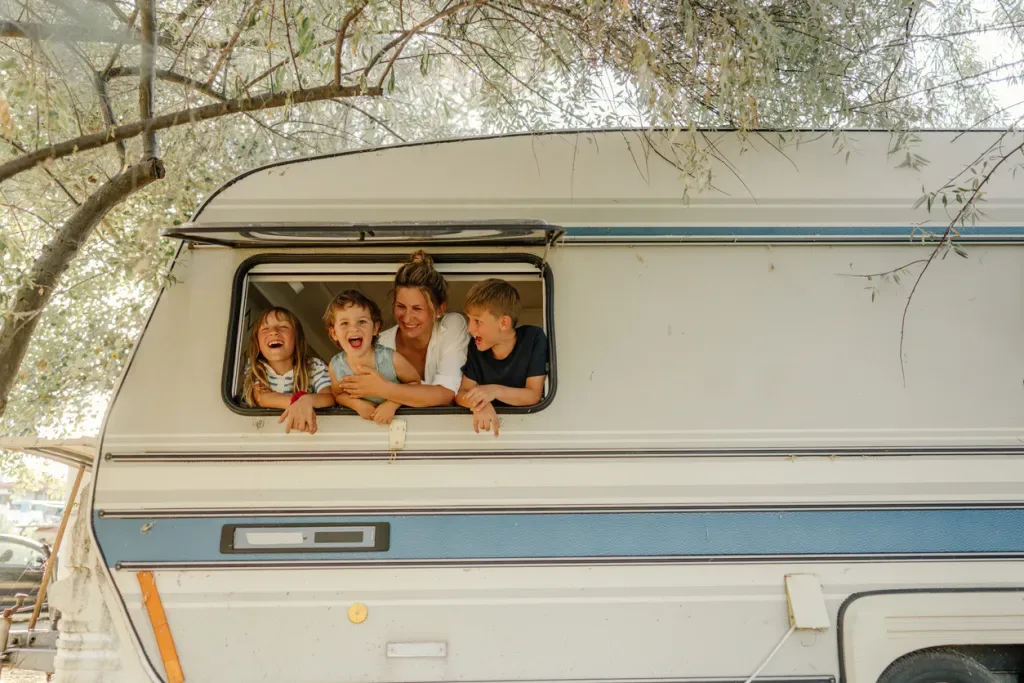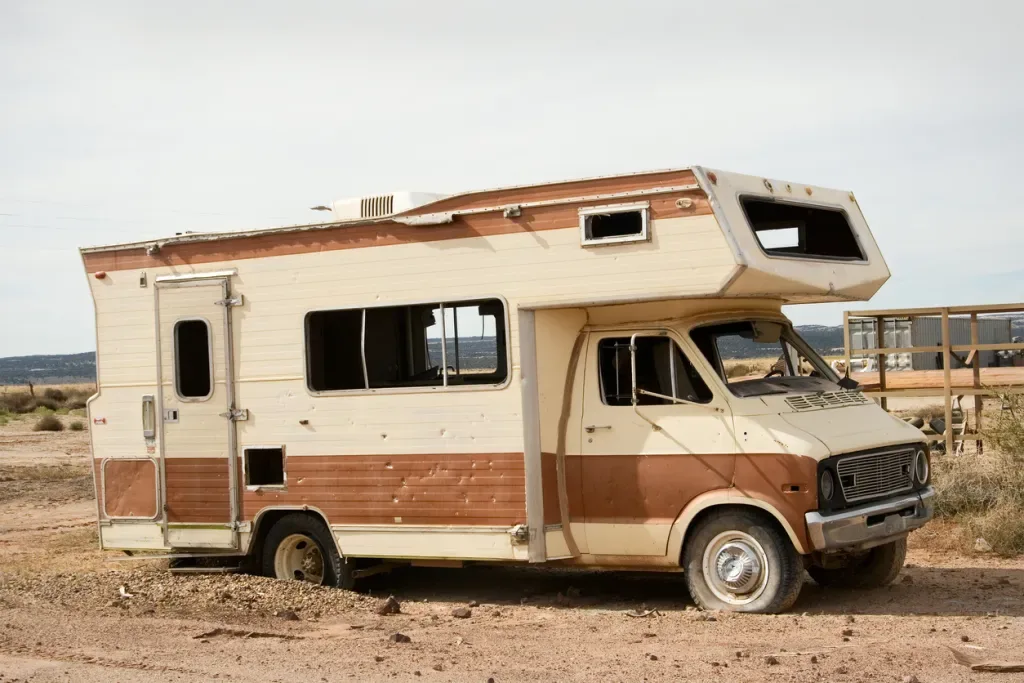While you may love your RV, a different rig may offer you and your family more comfort. Feeling cramped or unsafe while driving down the road can put a crimp in your adventures.
But knowing when it’s time for a new rig isn’t always straightforward, especially when you feel you’re OK with fixing things yourself. Or you’re fine living with less space. But maybe your kids or spouse are uncomfortable.
Today we look into five ways to identify when it might be time for a different RV.
Let’s get started!

Thinking About Buying a Different RV?
Whether using your RV as a full-time home or vacation vehicle, you’ll probably know when it’s time for a different one. But navigating the choices available on the market can be overwhelming.
Think back to when you bought your current rig. You had a lot of things to consider then too.
If this is your first RV, one aspect that’ll be different is a possible trade-in value towards a newer unit. However, trading in your current rig may not be the best option. You might get more for it by selling in the private market. This is especially true for older motorhomes.
When is the Best Time to Buy a Different RV?
While researching buying a different RV, you’ll discover purchasing at the end of the year is best. Unless it’s an emergency, we don’t recommend changing rigs in the middle of summer. This would be the peak season when units have higher price tags.
Wait until fall or winter, when sellers and dealers will likely offer better deals. Whether looking for a brand new motorhome or a used RV, you’ll typically save money purchasing in October or November.
Another thing to watch is when newer models become available at dealerships, which often happens earlier in the year, around March or April.
If you have an eye on a new RV or trailer but the price is too high, wait until the upgraded versions roll out. The cost of the previous year’s models often comes down a bit. But it won’t necessarily happen right away, so hold off on purchasing for a while longer.
So how do you know when it’s time to change your current RV? Here are five things to keep in mind when making that decision.
How do you determine your current RV’s value? Does an RV Blue Book Even Exist?
#1 Increased Maintenance Costs
As with any vehicle, maintenance is a fact of life. Especially if you want to keep it running in tip-top shape. While certain expenses like oil changes, tune-ups, and new tires are standard, unexpected costs can hurt your pocketbook.
When your dream RV becomes more of a nightmare, it might be time for a change. As the rig ages, certain aspects of keeping it running efficiently might begin to add up.
Mechanical parts inside and out break down over time and will need replacing. And appliances like water heaters, generators, and refrigerators aren’t cheap. Many RV owners will tell you it isn’t uncommon for multiple things to stop working simultaneously.
In addition, the more you use your rig, the sooner you’ll start to notice a reduction in fuel efficiency. If your RV is guzzling gas or diesel more than it did in the early days, it might be time for a different unit.
#2 Lack of Space
Whether it’s new additions to the family or younger kids getting bigger, your living space may begin to feel a bit tight. Or you might be running out of available storage area.
Many new RVers tend to start with smaller rigs. It seems inevitable that you could face the reality you need more room over time. And this isn’t just the case for large families. If you’re traveling as a couple or even solo, being able to spread out is important.
If your current RV or trailer doesn’t have slide-outs, you might consider upgrading to a unit with at least one. It’s amazing how much more living space they provide.
So if a lack of sleeping, living, or storage space is something you’re facing, a different RV could be the answer. You may not have to go much larger than your current rig to make everyone more comfortable.

#3 Outdated Features
You may be familiar with older homes having issues with outdated electrical features. The same is true with RVs.
Some newer resorts may have power outlets that simply can’t accommodate motorhomes or trailers considered vintage. If you like staying in places with hookups but your rig has older electrical features, it might be time for a different RV.
However, it isn’t just outlets that might be a problem. Maybe your unit doesn’t have the battery capacity to fulfill your boondocking and off-grid living desires. While most modern rigs can handle additional batteries, some older RVs don’t have the space or proper wiring to add more.
And if solar power is something you want to rely on, that’s another thing older models often can’t add safely. Almost any RV can utilize portable solar panels. But if you want to permanently install them on the roof, it might not be an option for your beloved vintage unit.
#4 Diminishing Trade-In Value
If you’re hoping to get a decent trade-in value for your motorhome, start the process sooner rather than later. As your current rig ages, the less it’ll be worth when the time comes to trade it in for a different RV.
You could also consider selling it privately. But maybe you don’t want to deal with the hassle of showing it to multiple people. In that case, a trade-in at a dealership is the way to go.
Returning to where you initially bought your rig could get you a better deal than anywhere else. Many RV dealers love maintaining long-term customer relationships. So if you had a good experience with them, consider using the same people again.
The time to start planning for top-dollar trade-in value is when you realize you want a different RV. Get your unit appraised ASAP so you know how much it’s worth.
We investigated the myth: Can an RV Increase in Value?

#5 Safety Concerns
Whether you’re a solo traveler or have a family to consider, safety should always be a top priority. The older an RV gets, the more likely breakdowns become.
We’re talking about things like engine malfunctions, propane leaks, and water damage. Any of these issues can result in unsafe situations. While fixing things as they break may seem cheaper, it could cost you more in the long run.
It’s not uncommon for RV owners to spend anywhere from $3,000 to $10,000 annually to maintain their rig, even if they’re handling many issues themselves rather than using repair shops. If you don’t feel mechanically inclined, you’ll likely spend more than that fixing up your older motorhome.
Choosing a newer unit versus continuing to work on your current one could save you money and offer a safer ride. A different RV with better features may be just what you need for better peace of mind going down the road.
Thinking of buying a used RV? Dive into Buying a Used Motorhome – How to get the most for your money and not get burned.
A Different RV Could Be in Your Future
So, is it time for you to change your current RV? If any of these issues we mentioned bring to mind concerns with your motorhome, maybe the answer is yes.
Perhaps by the end of the year, you’ll be driving a newer rig with more space and better safety features. With so many options on the market, it doesn’t hurt to start thinking about what you want in a different unit.
We’ll Help You Find the Best Free Camping in the USA
You should give it a try!
As a matter of fact, these free campsites are yours to enjoy. Every time you pay federal taxes, you’re contributing to these lands.
Become a FREE CAMPING INSIDER and join the 100,000 campers who love to score the best site!
We’ll send you the 50 Best Free Campsites in the USA (one per state). Access the list by submitting your email below: